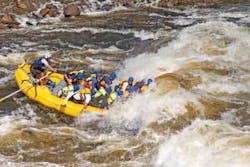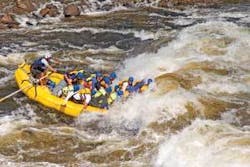Navigating white water
Could your journey down the “river of life” be better described as a wild ride through the rapids these days? If so, you are welcome to sit beside me in the raft!
Over 15 years ago, Peter Vaill, DBA, one of the world’s most influential organizational-change theorists, introduced the concept of “permanent white water.” Aptly named, it described a time that is challenging, difficult to read, constantly changing, unpredictable, and unstoppable. Sounds like today, doesn’t it? The international and domestic scenes are characterized by a “crisis of the month” ... or is it a “crisis of the week”? Unexpected surprises throughout society are the norm, and the pace of change and transition keeps on accelerating.
Vaill connected white water to the business environment, but I also see it applying directly to the many dimensions of our individual lives. Add to the above descriptors the overwhelming state of busyness nearly everyone is now experiencing, and you have a day-to-day environment unlike any I have lived through. Times of remarkable change and turmoil have always been a part of life. But then things would calm down, and we would enjoy lengthy periods of calmness and tranquility. Those times of peacefulness seem to be fewer and more short-lived today.
Of course, this raft ride can be tiring, stressful, and even scary, but it also is exciting. Hidden behind the rocks and within the swirling eddies are opportunities that can make our downstream journey even more meaningful. To successfully navigate this white water phenomenon, what do we need to know? How do we need to think? What should we do?
1. Attitude, attitude, attitude
It may be an old message, but it’s a good message. Meeting any challenge always starts with attitude, and navigating white water is no exception. Yes, you have the choice to pull your raft out of the river, sit on the side of the bank, and wait until the water calms down. It won’t. Vaill suggests these rapids are permanent, and I believe any substantial calming is a long way off. If you don’t want life to pass you by, if you do want to continue to pursue your dreams, then your first step is to accept white water as a reality and commit yourself to navigating it as skillfully as possible.
Complaining about it won’t help. Jack Nicklaus was noted for playing well on particularly difficult golf courses. When he would hear another player griping about the length of the rough or the speed of the greens, he would strike him from the list of serious contenders. Nicklaus knew that winning the tournament was partially a mental game. You had to accept whatever difficulties the course presented, and move on. Life is no different.
2. Discover the opportunity for growth
The Center for Creative Leadership has identified that the number one factor in developing leadership skills is the hardships that leaders endure. When white water takes us outside our comfort zone, it forces us to dig deep, discover our best talents, and learn new skills. In this sense, white water is our teacher. It shows us how to embrace change and forces us to confront challenge. It is a catalyst to our growth in many beneficial ways, and navigating it successfully propels our performance to higher levels.
3. Adaptability is crucial
In a white water world, the power of the current can change the configuration of the rapids overnight. The guides working the river may suddenly discover that the boulders have moved. The safe route that they had become accustomed to is no longer there. They must immediately shift their thinking, and adapt to these new circumstances. So it is with our lives. Unexpected events, both positive and negative, alter the landscape. A window of opportunity suddenly opens. A key team member decides to leave. An aging parent falls ill. Our flexibility is tested and our problem-solving skills take on increased importance. Navigating through these rapids is not necessarily accomplished by the strongest, but by those most able to adapt rapidly to change. Is adaptability a strength for you, or is it a skill you need to work on?
4. Continual learning is mandatory
In our work, technological advancement and an increasingly competitive environment add to the turbulence of the rapids. Just keeping up is a challenge. The knowledge and skill that you now have will provide a foundation for whatever the future holds. But alone, this knowledge and skill will not be enough to navigate the changing world down-river. No matter what your specific work responsibilities are, continual learning is not an option. It’s mandatory.
Continual learning is not just reading an occasional book, or periodically taking a course. It is a day-to-day, integrated discipline practiced on the job. Continual learning is “a state of being.” Without a doubt, the books and courses are valuable. But your deepest insights will come from taking what you learn and applying it as you experience work and life on a day-to-day basis. Everything you do in this transitioning world is a journey of exploration, and much of it today is self-directed. You must have the discipline to focus on what is happening around you and seek to discover what it means to you and your performance.
5. Partnering is essential
Although we are all exploring new frontiers, I don’t recommend the role of the rugged individualist. The challenges are too great, and tackling them by yourself is risky and lonely. What skills and talents in others will complement your own? With whom do you feel safe? What can you contribute to others during this ride through the rapids? Whether it applies to a family, a business, or your personal life, a team culture has never been more important. Working together is not just about managing change. The goal is also to create and manage stability. Partnering will open up new passages through the white water. Who do you want with you? Invite people into your raft who you know you can count on. Relationships and the support that comes with them have never been more important.
Assessing your white water experience
Change is no longer just a concept to be studied and discussed. It’s a moveable world, and change is life! In the midst of the challenges this presents, assessment, curiosity, and reflection are valuable tools. What was one major source of white water that you faced over the past year? How did you deal with it? What went well? What could you have done differently? What did you learn from this experience? Consider asking someone to have a dialogue with you about your answers. You will learn more if you do, and you may be able to help the other person navigate the rapids as well.
If white water has been a part of your life, you know one thing for sure. You have survived! You are better equipped now to meet the challenges you will most certainly face in the future. Even if the challenge is bigger, you are bigger as well. Trust yourself and those in the raft with you, and be each other’s guides. Float down river with confidence and optimism, and celebrate the adventure!Doug Young, MBA, and his spouse Marlyn, MCC, have a professional speaking and executive/team coaching business in Parker, Colo. They co-author this column and share an interest in leading-edge business concepts, achieving personal and professional potential, serving patients, and improving how people work together. Marlyn’s insights into people and relationships and her coaching skills complement Doug’s motivating and mind-expanding presentations. Contact them by e-mail at [email protected], by phone at 877-DMYOUNG, or visit their Web site at www.dmyoung.com.

